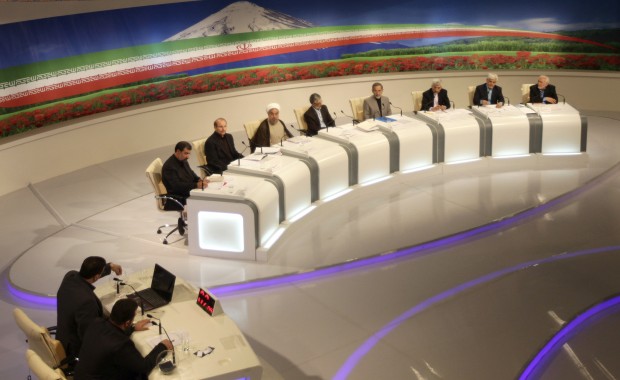
In this photo released by the Islamic Republic of Iran Broadcasting on Wednesday, June 5, 2013, presidential candidates (from right), Mohammad Qarazi, Mohammad Reza-Aref, Saeed Jalili, Ali Akbar Velayati, Gholam Ali Haddad-Adel, Hasan Rouhani, Mohammad Baqer Qalibaf and Mohsen Rezaei, attend a TV debate in a state-run TV studio in Tehran. (AP Photo/Islamic Republic of Iran Broadcasting, Mehdi Dehghan)
London, Asharq Al-Awsat—The final live debate focusing on the political agendas of the eight approved Iranian presidential candidates took place yesterday in a tense atmosphere.
This heated debate represents the climax of the electoral campaign season and saw candidates criticize each other’s respective track records. Foreign policy dominated the first half of the live debate, with candidates trading criticisms and accusations of failure.
Independent candidate Moshen Rezaei, former commander of Islamic Revolutionary Guards Corps (IRGC), started the debate by rejecting the government’s current policies, which have led to widespread poverty across the country.
Rezaei emphasized that Iran has not felt the full force of international sanctions, saying that what it has experienced so far represents between just 30% and 40% of this. He warned that the worst is yet to come.
“Why have the Americans not entered into proper negotiation with Iran?” Rezaei asked, claiming that this was because the Tehran government is struggling to manage the country’s economy.
Rezaei stressed that the very survival of the Islamic Republic is incumbent on economic improvement.
Regarding the Arab Spring, which he termed the “Islamic Awakening,” the former IRGC commander acknowledged that this represented a unique opportunity for Tehran in the region.
The next candidate to outline his political agenda was Mohammad Baqer Qalibaf, the mayor of Tehran. Qalibaf rejected the foreign policy that Iran has pursued over the past 24 years, since the end of the Iran–Iraq War.
Qalibaf also championed his performance as the country’s chief of police, emphasizing that he had defended the right to peaceful protests.
Moderate candidate Hassan Rouhani, Iran’s former chief nuclear negotiator, began by emphasizing universal citizenship right for all Iranians regardless of religious or ethnic affiliations.
He stressed the importance of rationality and prudence to resolve Iran’s challenging foreign policy issues.
Rouhani fiercely defended Iran’s previous nuclear negotiation policy and its effectiveness in preventing a confrontation with the US-led allies in the aftermath of the Afghanistan and Iraq wars.
His statements were confronted by Saeed Jalili and Qalibaf. They claimed that the tolerant foreign policy advocated by Rouhani would be fruitless and even serve to provoke further pressure on Iran to retreat from its “legitimate and inalienable rights.”
Rouhani also announced his complete rejection of the Ahmadinejad government’s foreign policy and promised to reverse course.
Rouhani and Qalibaf traded bitter accusations about their respective involvement and positions during the 2001 student unrest, when Rouhani served as secretary of the Supreme National Security Council and Qalibaf was Iran’s chief of police.
Ali Akbar Velayati—the foreign minister during the Khamenei and Hashemi Rafsanjani presidencies—strongly defended his track record in stabilizing Iran’s relationship with the international community following the eight-year Iran–Iraq War. He pledged to reverse Iran’s position of regional and international isolation.
The necessity of changing Iran’s approach to future nuclear negotiations served as the debate’s focal point.
Velayati claimed that Ahmadinejad’s government had sabotaged his efforts to constructively negotiate with France and Russia to reach an agreement on Iran’s controversial nuclear project.
Both Velayati and Rouhani lambasted Saeed Jalili’s performance as Iran’s chief nuclear negotiator, saying that he lacked both the ability and intent to reach an agreement.
Velayati and Rouhani seemed to agree on the nuclear issue, advocating a complete overhaul of Iran’s discourse and approach. Haddad-Adel, Qalibaf, and Jalili remained in favor of the firm stance Tehran has taken over the past eight years.
Velayati also defended the president’s constitutionally-defined powers, rejecting the complaints of previous presidents—Khatami and Ahmadinejad—regarding a lack of authority.
Mohammad-Reza Aref, who served as vice president under Khatami and is the only self-declared “reformist” candidate in the race, reminded his audience of the previous good work carried out by the reformist camp and expressed regret about the “unjustified” ban on reformist candidates.
Aref also condemned Iranian state TV, which had accused former president Khatami of being a spy. He pledged to put an end to such authoritarian and anti-democratic measures if he is elected.
Independent candidate Mohammad Qarzai expressed his dissatisfaction with the disagreements between the other candidates and told a number of anecdotes of his past performance as telecommunication and oil minister in the 1980s and early 1990s. He promised to initiate political devolution through the election of provincial governors.
The debate moderator announced that more than 45 million viewers watched the first two debates, while viewing figures for the final debate are expected to exceed this.
According to official data, more than 50 million voters are eligible to vote on June 24.
